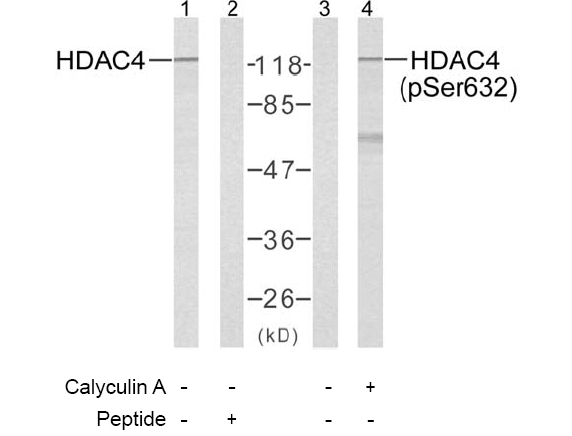HDAC4 pSer632 Rabbit Polyclonal Antibody
Other products for "HDAC4"
Specifications
| Product Data | |
| Applications | WB |
| Recommended Dilution | Suitable for use in Suitable for use in Western blot (1:500-1:1000). |
| Reactivities | Mouse |
| Host | Rabbit |
| Clonality | Polyclonal |
| Immunogen | The antiserum was produced against synthesized phosphopeptide derived from human HDAC4 around the phosphorylation site of serine 632 (A-Q-Sp-S-P). |
| Specificity | The antibody was affinity-purified from rabbit antiserum by affinity-chromatography using epitope-specific phosphopeptide. The antibody against non-phosphopeptide was removed by chromatogramphy using non-phosphopeptide corresponding to the phosphorylation site. HDAC4 (phospho-Ser632) antibody detects endogenous levels of HDAC4 only when phosphorylated at serine 632. |
| Formulation | PBS (without Mg2+ and Ca2+), pH 7.4, 150 mM NaCl, 0.02% Sodium Azide and 50% Glycerol. State: Aff - Purified State: Liquid purified Ig fraction. |
| Concentration | lot specific |
| Purification | Immunoaffinity chromatography using epitope-specific phosphopeptide. |
| Conjugation | Unconjugated |
| Storage | Store the antibody (in aliquots) at -20°C. Avoid repeated freezing and thawing. |
| Stability | Shelf life: One year from despatch. |
| Gene Name | histone deacetylase 4 |
| Database Link | |
| Background | Chromatin is a highly specialized structure composed of tightly compacted chromosomal DNA. Gene expression within the nucleus is controlled, in part, by a host of protein complexes which continuously pack and unpack the chromosomal DNA. One of the known mechanisms of this packing and unpacking process involves the acetylation and deacetylation of the histone proteins comprising the nucleosomal core. Acetylated histone proteins confer accessibility of the DNA template to the transcriptional machinery for expression. Histone deacetylases (HDACs) are chromatin remodeling factors that deacetylate histone proteins and thus, may act as transcriptional repressors. HDACs are classified by their sequence homology to the yeast HDACs and there are currently 2 classes. Class I proteins are related to Rpd3 and members of class II resemble Hda1p. HDAC4 is a class II histone deacetylase containing 1084 amino acid residues. HDAC4 has been shown to interact with NCoR. HDAC4 is a member of the class II mammalian histone deacetylases, which consists of 1084 amino acid residues. Its C terminal sequence is highly similar to the deacetylase domain of yeast HDA1. HDAC4, unlike other deacetylases, shuttles between the nucleus and cytoplasm in a process involving active nuclear export. Association of HDAC4 with 14-3-3 results in sequestration of HDAC 4 protein in the cytoplasm. In the nucleus, HDAC4 associates with the myocyte enhancer factor MEF2A. Binding of HDAC4 to MEF2A results in the repression of MEF2A transcriptional activation. HDAC4 has also been shown to interact with other deacetylases such as HDAC3 as well as the corepressors NcoR and SMART. |
| Synonyms | Histone deacetylase 4, HD4, KIAA0288 |
| Reference Data | |
Documents
| Product Manuals |
| FAQs |
| SDS |
{0} Product Review(s)
0 Product Review(s)
Submit review
Be the first one to submit a review
Product Citations
*Delivery time may vary from web posted schedule. Occasional delays may occur due to unforeseen
complexities in the preparation of your product. International customers may expect an additional 1-2 weeks
in shipping.






























































































































































































































































 Germany
Germany
 Japan
Japan
 United Kingdom
United Kingdom
 China
China



